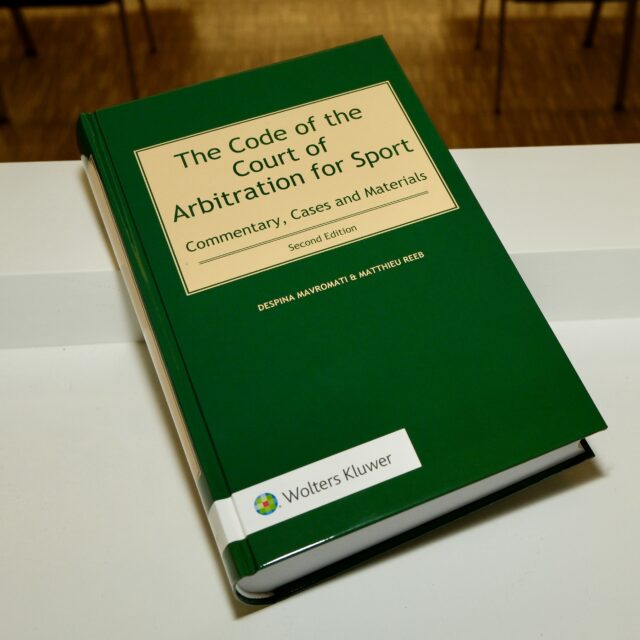SFT Judgment 4A_384/2017 – X. v. Federation A. & International Athletics Federation (IAAF) (doping)
Athlete X. v. Federation A. & International Association of Athletics Federation (IAAF) (doping) – The Issue
The Facts
The first-instance decision to suspend Athlete X
The case involved an international-level middle-distance runner (the Athlete) whose subsequent antidoping controls showed the highly likely use of a prohibited substance or method. Following a provisional suspension in April 2016, the Athlete was suspended for four years. The decision with grounds (that was part of the minutes of the meeting of the Federation’s Disciplinary Commission) was communicated to the Athlete in June 2016.
The Athlete’s Email to the CAS and the Statement of Appeal
In August 2016, the Athlete sent an email to his Federation, to the IAAF, to the World Anti-Doping Agency (WADA) and to the Court of Arbitration for Sport (CAS) whereby he “contested the decision” and “lodged an appeal against the decision”, attaching a letter with explanations. After not receiving an answer to his email and the attached explanations, the Athlete subsequently addressed, in January 2017, a new collective email sent to the same recipients. Shortly afterwards, the CAS Secretariat sent a message to the Athlete holding that it could not initiate an arbitration procedure based on this document, which did not fulfil the conditions for an appeal to the CAS.
Finally, on March 21, 2017, the Athlete filed a statement of appeal to the CAS along with a request for provisional measures, following which the CAS initiated the arbitration procedure. All other parties involved requested the termination of the procedure since the appeal was clearly filed late, in accordance with Art. R49 of the CAS Code (which provides for the time limits to file an appeal with the CAS).
The Termination Order issued by the CAS Division President
Following the above, the President of the Appeals Division of the CAS, based on its power to decide of Art. R49, issued a termination order holding that the appeal was inadmissible. In summary, the President concluded that, under Rule 42.15 of the IAAF Rules, the deadline for appeal to the CAS was 45 days from the day after the reception of the decision under appeal. In the present case, the time limit to appeal had started to run on July 1, 2016, which made the appeal filed on March 21, 2017 more than seven months late and therefore inadmissible.
The Athlete subsequently filed an appeal to the Swiss Federal Tribunal, requesting the annulment of the termination order and the granting of legal aid for the setting aside proceedings.
Appeal to the Swiss Federal Tribunal against an “award” – CAS Termination Order as a “challengeable” decision to the Federal Tribunal
The Federal Tribunal proceeded to a detailed analysis as to what constitutes a challengeable decision to the Swiss Federal Tribunal. Even though Art. 77 (1) (a) LTF (Federal Tribunal Law) refers to an “award” (final, partial, preliminary or interlocutory), it is possible to file an appeal to the Federal Tribunal against an order, to the extent that such order cannot be modified or repealed during the procedure.
Furthermore, the challengeable act does not need to derive from the Panel but can also be issued by the President of an arbitral Division of CAS, as was the case here.
More specifically, the Termination Order in this case was not a simple procedural order possible to be modified at a later stage of the proceedings but a decision on inadmissibility based on Art. R49 of the CAS Code. Additionally, the Athlete was affected by the decision under appeal, having an interest which is personal, current and worthy of protection (Art. 76 (1) LTF).

The Federal Tribunal Judgment
Violation of the principle “ne infra petita”
In his first argument, the Athlete alleged that the President omitted to express herself on one of his claims (Art. 190 (2) c Swiss Private International Law Act, PILA). More specifically, the CAS Division President dealt with the admissibility of the case only without addressing the other claims that the Athlete raised (that is, the disregard of the ADAMS Rules in the contested decision). The Federal Tribunal dismissed this argument holding that Art. 190 (2) (c) PILA does not include a plea that the arbitral tribunal omitted to decide on an important question for the outcome of the dispute (at 3.2).
Incompatibility of the CAS Award with substantive public policy
Non- respect of the Athlete’s private life & protection of his personal data
The second argument of the Athlete related to the violation of substantive public policy (at 4.2.1). The Athlete contended that the CAS Division President violated his right of respect of his private life and the protection of his personal data. It allegedly did so by validating the use of a private electronic messaging system for the notification of his disciplinary decision. 1
Again, the Federal Tribunal dismissed this argument for lack of sufficient reasoning but also because it is not possible to invoke a direct violation of the rules included in the European Convention of Human Rights (ECHR) or the Swiss Federal Constitution. This is so even if it is possible to invoke the principles deriving from these rules for a violation of Art. 190 (2) (e) PILA.
Violation of a party’s defense rights and its right to a fair trial
In his third argument, the Athlete asserted violation of his fundamental defense rights and his right to a fair trial: the CAS Division President declared his appeal late without having established in a legally acceptable manner the exact moment of reception of the disciplinary decision by the Athlete (at 4.2.2). The Federal Tribunal also dismissed this argument since the Division President had fixed the moment of reception of the decision under appeal on June 30, 2016 and this was binding upon the Federal Tribunal.
A “double degree of jurisdiction” does not emanate from the procedural public policy
Another argument that the Athlete raised was that, by declaring his appeal inadmissible, the CAS violated his “right to a second level of jurisdiction and the right to a fair trial”. This is an argument that parties have repeatedly brought before the Federal Tribunal and the latter has dismissed. In fact, and in accordance with persistent jurisprudence of the Federal Court, the right to a double degree of jurisdiction does not emanate from the procedural public policy in the meaning of Art. 190 (2) (e) PILA. What is more, the Appellant’s alleged good faith could not remedy the non-respect of the time limit to appeal (at 4.2.3).
“Leçon de vie”: importance of the strict respect of the provisions on the time limits to appeal
Ultimately, the Federal Tribunal stressed the importance of the procedural conditions for the legal remedies. The latter are necessary in order to ensure that the proceedings are conducted according to the principle of equal treatment. In this respect, and in order to preserve legal certainty, it is important to ensure a strict respect of the provisions related to the time limits to appeal.
Request for legal aid for the setting aside proceedings before the Swiss Federal Tribunal
The Athlete equally requested legal aid for the setting aside proceedings before the Federal Tribunal (based on Art. 64 (1) LTF). The Federal Tribunal reiterated the cumulative criteria of this provision. One of these criteria is that the appeal does not lack chances of success. The Federal Tribunal dismissed the request because the appeal did not meet this criterion.
The Takeaway
This is not a revolutionary judgment. However, it is a good review of the conditions to appeal to the Federal Tribunal against a decision that does not fall within the strict definition of an “award” within the meaning of Art. 77 (1) LTF. In this respect, a termination order – to the extent that it cannot be modified at a later stage, qualifies as an award for the purposes of the setting aside proceedings. It is also irrelevant that the drafter of the termination order was not an arbitral tribunal but the President of an arbitral division (or even the Secretary General). Interestingly, and even if the powers of the CAS Division Presidents (and the Secretary General) are normally limited to decisions related to jurisdiction based on the CAS Code (e.g. right to terminate the proceedings when the appeal is “on its face, late” according to Art. R49 CAS Code), the “award” can be attacked also on other grounds listed in Art. 190 (2) PILA.
Another point to retain is that the good faith of a person filing an appeal late (pursuant to the applicable procedural rules) is not sufficient to remedy the non-respect of the time limit to appeal the decision, whose respect is essential in order to establish legal certainty and protect the equality of the parties. Finally, this judgment clarified that it is possible to grant legal aid for setting aside proceedings in international arbitration, including sports arbitration. However, the requesting party must meet the cumulative conditions (including that the appeal does not lack chances of success), which is a high burden to meet in view of the – statistically – low chances of success of a motion to set aside an arbitral award before the Swiss Federal Tribunal.








